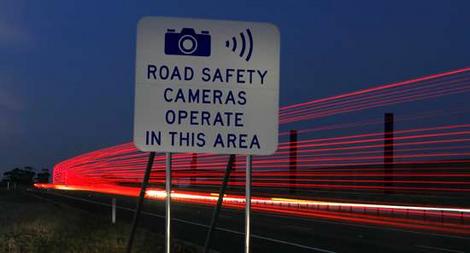Australian Appeals Court: Without Authentication Photo Tickets Are Hearsay
California courts are not alone in questioning the validity of red light camera and speed camera photographs as valid legal evidence. On Friday, the Queensland, Australia Court of Appeal ruled that automated ticketing cases require more than a pair of images in a folder to make a speeding case that will stick. The motorist, a non-lawyer, won her case against the government with only the help of her husband.
A camera accused Bilyana LeKich of driving 114 km/h (70 MPH) in a 100 zone (62 MPH) on Bruce Highway in Burpengary on September 4, 2008. Lekich pleaded not guilty in Caboolture Magistrate’s Court where a judge did little more than look at the photos and declare that she was guilty and must pay A$200. LeKich appealed to a district court which overturned this conviction on the grounds that the photos should not have been entered as evidence.
Under Australian law, the police commissioner must certify the photographs as “properly taken” at the time and location stated on the citation. The commissioner can delegate this power to another police officer, but the prosecution never offered any evidence that the power had been properly delegated — other than the fact that a police officer’s signature on the ticket was proof that the power had been delegated. The lower court judge did not buy the argument.
“The starting point, of course, for any criminal prosecution is that the evidence is to be given orally,” the Brisbane District Court judge ruled last year. “Evidence in writing is prima facie hearsay and is inadmissible unless it comes within a statutory exception to the rule against hearsay…. There is certainly nothing in s. 120 of the act which permits the delegate to certify to the existence of the delegation where the commissioner’s power has been delegated.”
As hearsay, the photographs were inadmissible and Queensland Police Service was left with nothing to prove a case against LeKich. Court of Appeal Justice Hugh B. Fraser, writing for the three-judge panel, agreed with the district court findings because proper procedure is important when a signature constitutes automatic proof.
“The consequences of a delegation by the commissioner are by no means insignificant,” Fraser wrote. “It arms a police officer with power to provide prima facie proof of an offense merely by signing a certificate which s. 120 otherwise requires to be signed by the commissioner. It does not seem unduly pedantic to insist upon proof of such a delegation where as the primary judge explained, the applicant [Queensland Police Service] could have taken advantage of the simple mode of proof which the legislature has provided.”
A copy of the decision is available in a 150k PDF file at the source link below.
Dixon v. LeKich (Court of Appeal, Queensland, Australia, 8/13/2010)
[Courtesy: Thenewspaper.com]
More by The Newspaper
Latest Car Reviews
Read moreLatest Product Reviews
Read moreRecent Comments
- ToolGuy™ I respect what the seller is doing, but this vehicle is not for me. (Seller doesn't care, has two people lined up already.)
- SCE to AUX How well does the rear camera work in the rain and snow?
- MaintenanceCosts The Truth About Isuzu Troopers!
- Jalop1991 MC's silence in this thread is absolutely deafening.
- MaintenanceCosts Spent some time last summer with a slightly older Expedition Max with about 100k miles on the clock, borrowed from a friend for a Colorado mountain trip.It worked pretty well on the trip we used it for. The EcoBoost in this fairly high state of tune has a freight train feeling and just keeps pulling even way up at 12k ft. There is unending space inside; at one point we had six adults, two children, and several people's worth of luggage inside, with room left over. It was comfortable to ride in and well-equipped.But it is huge. My wife refused to drive it because she couldn't get comfortable with the size. I used to be a professional bus driver and it reminded me quite a bit of driving a bus. It was longer than quite a few parking spots. Fortunately, the trip didn't involve anything more urban than Denver suburbs, so the size didn't cause any real problems, but it reminded me that I don't really want such a behemoth as a daily driver.


































Comments
Join the conversation
Although this method is controversial, it does decrease the amount of speeders which is one goal of these cameras. Sure the gov income is nice, but maybe they expected to lose some cases.
you Americans will probably be quite bemused to find that people in the state of Victoria are often put under a 4km/h leeway... that is if you do 64km/h in a 60 zone, you will receive a fine. for you imperial folk that is 2.5 mph margin of error that is of course amazing you will also find that many European cars often calibrate their speedos to 30-50-70-90km/h increments which makes this margin impossible to gauge